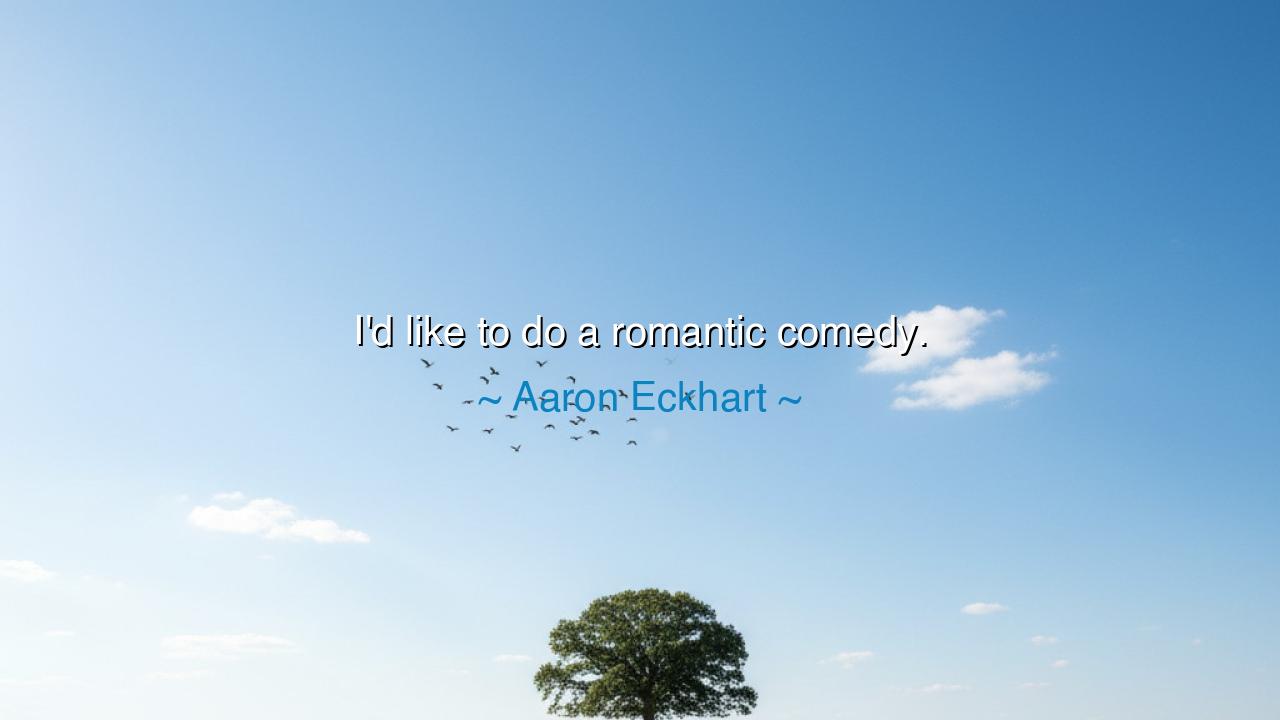
I'd like to do a romantic comedy.






“I’d like to do a romantic comedy.” Thus spoke Aaron Eckhart, a man often known for roles of intensity, darkness, and conflict. His words reveal not only a desire for variety in his craft but also a longing to step into a different realm of storytelling—a realm lighter, gentler, yet no less profound. For while tragedy and violence capture the struggle of man against fate, the romantic comedy captures the struggle of man and woman toward unity, joy, and understanding. It is no lesser art to make hearts laugh and hope than it is to make them tremble in fear.
The origin of this wish lies in the eternal balance of the human spirit. Even the strongest warrior, after battle, longs for peace. Even the stern philosopher, after wrestling with truth, longs for companionship. Eckhart’s yearning reflects this same truth: to move beyond shadow into light, beyond tension into delight. To play in a romantic comedy is to dwell not in destruction but in creation, not in bitterness but in tenderness. It is to remind audiences that love, with all its folly and laughter, is the most natural of human pursuits.
The ancients too knew the value of such tales. After the tragedies of Aeschylus and Sophocles, which showed men crushed by fate, the comedies of Aristophanes lifted the spirit, mocking folly and celebrating love. The romantic comedy in particular has ancient roots in the plays of Menander and later in Shakespeare, where mistaken identities, playful arguments, and joyful unions revealed that the gods themselves smiled upon the joining of hearts. To wish to perform in such a genre is not to choose simplicity—it is to choose to participate in a tradition as old as storytelling itself.
Consider Shakespeare’s Much Ado About Nothing. The witty sparring of Beatrice and Benedick is not mere entertainment; it is a mirror of life’s own battles between pride and vulnerability, fear and longing. When at last their pride falls away and love is confessed, the audience feels triumph not because a kingdom was won, but because two souls found one another. This is the heart of the romantic comedy—its victories are quieter than those of tragedy, but they are victories that every soul can share.
Eckhart’s words also carry humility. A man known for roles of steel and fire dares to admit he desires something softer. This shows that true strength is not in dwelling forever in harshness, but in daring to enter vulnerability. To perform in a romantic comedy is to risk the ridicule of those who prize only the “serious,” but it is also to embrace the nobility of giving people hope, laughter, and the reminder that love is possible even in an age that often forgets it.
The lesson here is timeless: do not limit yourself to one mask, one role, or one expression of your being. Just as actors long to play many roles, so too should each of us seek fullness in life. There is honor in facing tragedy with courage, but there is equal honor in embracing joy with open arms. The romantic comedy is not escapism; it is a celebration of resilience, for to laugh and to love after hardship is to prove that the human spirit cannot be crushed.
Practical action flows from this: welcome variety into your own life. If you have dwelt long in seriousness, allow yourself laughter. If you have labored long in duty, allow yourself play. If you have carried sorrow, make space for joy. Seek out the romantic comedy not only on stage or screen but in your own days—moments of humor, of tenderness, of delight that break through the heaviness of existence.
So, children of tomorrow, remember Aaron Eckhart’s longing. His wish to perform in a romantic comedy is not mere whim, but a symbol of the eternal desire to balance darkness with light, tragedy with joy, loneliness with love. Live this balance yourself, and you too will find that your story, like the comedies of old, may end not in despair, but in laughter, reconciliation, and the triumph of the human heart.






AAdministratorAdministrator
Welcome, honored guests. Please leave a comment, we will respond soon